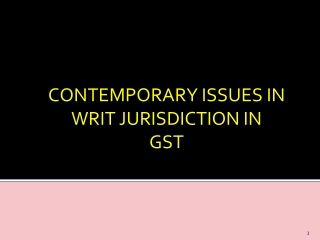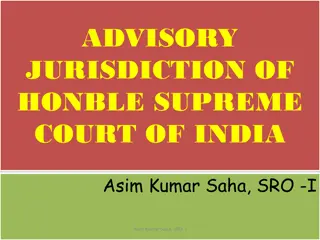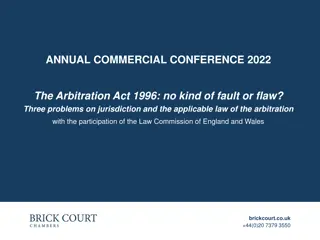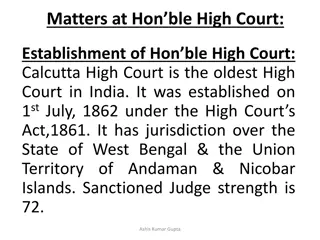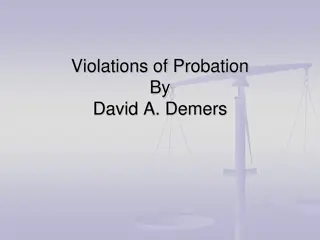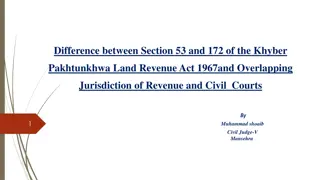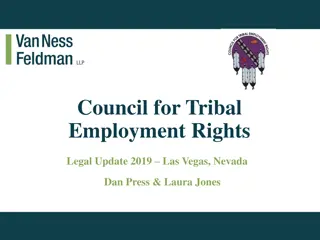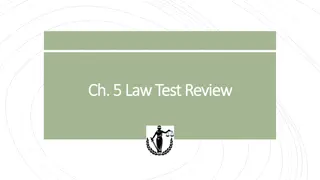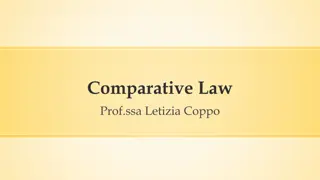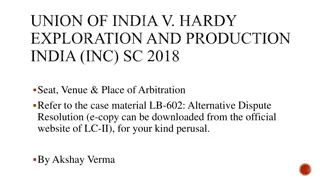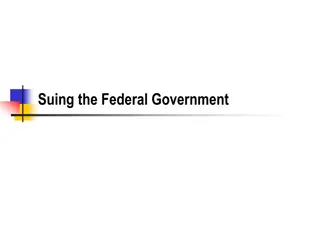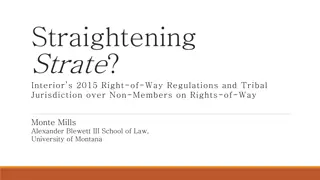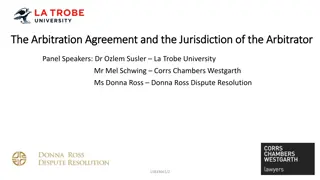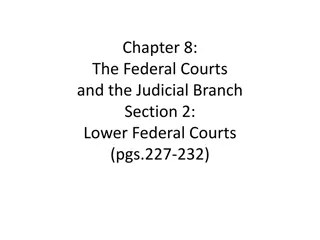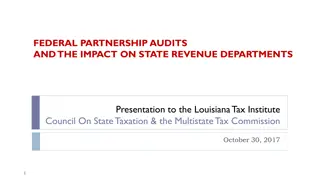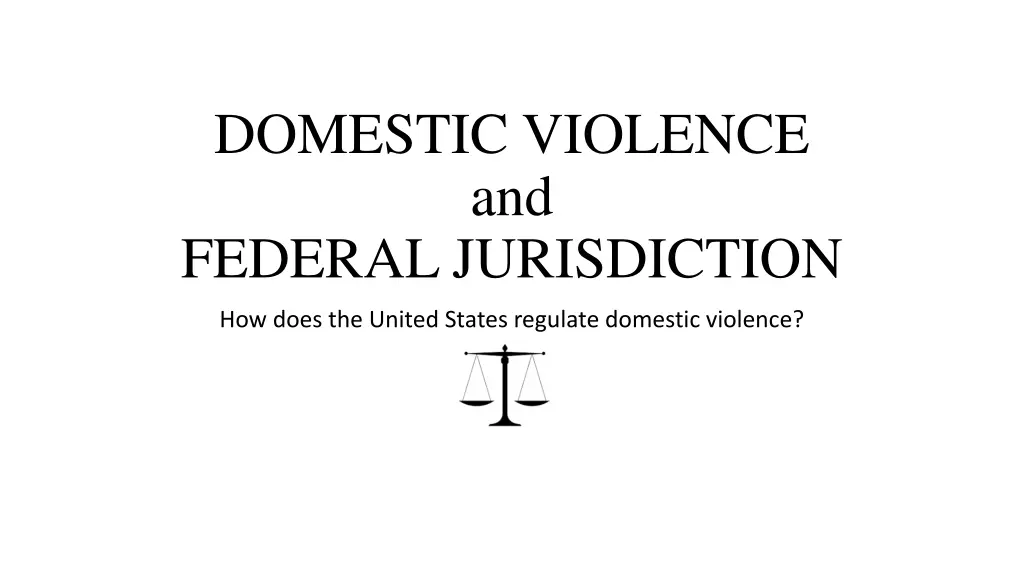
Regulation of Domestic Violence in the United States
The United States regulates domestic violence primarily through state court systems, with federal laws such as the Violence Against Women Act (VAWA) providing additional protections and remedies. While most domestic violence matters are handled in state courts, federal jurisdiction is invoked in cases involving interstate commerce or certain criminal activities related to domestic violence. The VAWA encompasses criminal statutes, support for victims' rights, and federal funding for services and programs aimed at addressing domestic violence. However, federal authority is limited by Supreme Court decisions, such as United States v. Morrison in 2000, which restricted Congress' ability to enact certain civil remedies under VAWA. Despite these limitations, VAWA criminal statutes still cover offenses related to interstate commerce like travel to commit domestic violence and cyberstalking.
Uploaded on | 0 Views
Download Presentation

Please find below an Image/Link to download the presentation.
The content on the website is provided AS IS for your information and personal use only. It may not be sold, licensed, or shared on other websites without obtaining consent from the author. If you encounter any issues during the download, it is possible that the publisher has removed the file from their server.
You are allowed to download the files provided on this website for personal or commercial use, subject to the condition that they are used lawfully. All files are the property of their respective owners.
The content on the website is provided AS IS for your information and personal use only. It may not be sold, licensed, or shared on other websites without obtaining consent from the author.
E N D
Presentation Transcript
DOMESTIC VIOLENCE and FEDERAL JURISDICTION How does the United States regulate domestic violence?
MOST DOMESTIC VIOLENCE ISSUES ARE HANDLED IN STATE COURT ORDERS OF PROTECTION: EPO/DVO DISSOLUTION OF MARRIAGE/CUSTODY CASES JUVENILE DEPENDENCY/NEGLECT/ABUSE CASES
FEDERAL LAW TOUCHES ON DOMESTIC VIOLENCE MATTERS IN SEVERAL WAYS VIOLENCE AGAINST WOMEN ACT ( VAWA ) CRIMINAL STATUTES ARISING OUT OF VAWA FULL FAITH AND CREDIT TO ORDERS OF PROTECTION VICTIMS RIGHTS LAWS FIREARMS OFFENSES
VIOLENCE AGAINST WOMEN ACT Signed into law by President Bill Clinton on September 13, 1994 Established the Office on Violence Against Women within the US Department of Justice and funded the investigation and prosecution of crimes against women Numerous grant programs and services, including: funding for the National Domestic Violence Hotline; community violence prevention programs; and legal aid organizations providing services to victims of domestic violence Established a federal civil remedy for the victims of gender-motivated violence so they could sue their attackers in federal court (codified in 42 U.S.C. 13981)
LIMITS ON FEDERAL AUTHORITY: UNITED STATES v. MORRISON, 529 U.S. 598 (2000) The Supreme Court struck down the VAWA federal civil remedy for victims of gender-motivated violence to sue their attackers in federal court in a sharply divided 5-4 opinion The Commerce Clause did not provide Congress with the authority to enact the civil remedy provision of 42 U.S.C. 13981 Rejected Congressional findings that gender-motivated violence affected interstate commerce by deterring victims from traveling, engaging in employment, and transacting in interstate commerce. Congress cannot regulate noneconomic, violent criminal conduct based solely on that conduct s aggregate effect on interstate commerce.
VAWA CRIMINAL STATUTES RELATING TO INTERSTATE COMMERCE 18 U.S.C. 2261: Interstate Travel to Commit Domestic Violence 18 U.S.C. 2261A(1): Interstate Stalking 18 U.S.C. 2261A(2): Cyber Stalking 18 U.S.C. 2262: Interstate Travel to Violate an Order of Protection
FULL FAITH AND CREDIT FOR ORDERS OF PROTECTION 18 U.S.C. 2265 provides that any protection order issued by a court of one State, Indian tribe, or territory shall be accorded full faith and credit by the court of another State, Indian tribe, or territory Has some limitations relating to jurisdiction over the parties, reasonable notice and opportunity to be heard, and mutual protection orders Registration or filing in foreign jurisdiction is not required for enforceability Limits internet publication of protection order information
VICTIMS RIGHTS LAWS A victim has the right to speak at a detention hearing for a defendant accused of a VAWA crime (Sections 2261, 2261A or 2262) pursuant to 18 U.S.C. 2263 Important rights under the Crime Victims Rights Act, 18 U.S.C. 3771, including the right to notice of public court proceedings, right not to be excluded from court proceedings, and the reasonable right to confer with the attorney for the Government in the case. Broad Right to Restitution under 18 U.S.C. 2264 Self-Petitioning for Battered Immigrant Women and Children for independent legal residency pursuant to 8 U.S.C. 1154
FIREARMS AND DOMESTIC VIOLENCE 18 U.S.C. 922(g)(8) prohibits possession of a firearm while subject to a protection order. The protection order must have been issued following a hearing as to which the defendant had actual notice and an opportunity to participate, restrain the person from certain specified acts, and include certain findings relating to danger. 18 U.S.C. 922(d)(8) prohibits the transfer of a firearm to someone subject to a protection order. 18 U.S.C. 925 provides an exemption from the above for official use by a law enforcement officer or military personnel while on duty 18 U.S.C. 922(g)(9) prohibits possession of a firearm after conviction of a misdemeanor crime of domestic violence
More ATF Form 4473 incorporates all of the disqualifiers of 922, including those relating to domestic violence. A potential purchaser of a firearm from a federally licensed firearm dealer must complete the form and certify that he/she is not subject to a valid protection order and has not been convicted of a qualifying misdemeanor crime of domestic violence. Providing false information is a violation of 18 U.S.C. 922(a)(6).
Reasons some doubted constitutionality of 922(g)(8) Historical test of Bruen no protection orders in 1791 or 1868 Protection orders typically do not involve a jury trial No right to counsel at public expense in a protection order hearing Preponderance of the evidence legal standard for deprivation of a civil right, NOT beyond a reasonable doubt
BUT 922(g)(8) IS CONSTITUTIONAL United States v. Rahimi, 144 S.Ct. 1889 (2024) Upheld the constitutionality of 922(g)(8) against a facial Second Amendment challenge (reversing Fifth Circuit) 8-1 decision with Justice Thomas dissenting Defendant grabbed his girlfriend by the wrist, dragged her to his car, and shoved her in, causing her to strike her head against the dashboard. Also fired shots as his girlfriend fled. Later told girlfriend he would shoot her if she reported him to the police. Analyzed history from the Statute of Northampton in 1328 forward to conclude that history supported disarming those subject to a protection order
Rahimi contd Historical Analogue No. 1: Surety Laws designed to prevent violence before it occurred. Those suspected of future misbehavior could be required to provide pledges or securities or face jail. Surety laws could be invoked to prevent all forms of violence, including spousal abuse. Wives could demand surety from husbands for good behavior. Surety laws targeted the misuse of firearms. Historical Analogue No. 2: Going Armed Laws part of ancient common law prohibition on affrays. These laws traced their origin to the Statute of Northampton and prevented riding or going armed to terrify the good people of the land.
Rahimi contd Other Considerations 922(g)(8) does not broadly restrict arms use by the public generally Long tradition of regulation of firearms possession by those who represent a credible threat to the physical safety of another Disarmament is temporary like surety laws Historical analogue is required, not a historical twin
WHATS NEXT? Possible federal regulation of coercive control An act or a pattern of acts of assaults, threats, humiliation, and intimidation or other abuse that issued to harm, punish, or frighten the victim Eight states have added coercive control to their protection order statutes Legislation will be introduced in Kentucky next year

